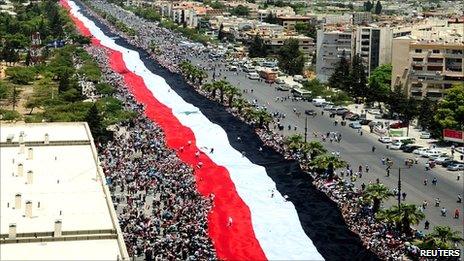Syria eyewitness: Damascus divided on Assad regime
- Published

A journalist in Damascus - who cannot be named for security reasons - reports on the growing differences of opinion within the Syrian capital on how the crisis should end.
After three months of anti-government protests and a bloody crackdown by the regime of President Bashar al-Assad, Syria is becoming a country divided.
While anti-regime protests continue across the country, the streets of the capital Damascus have played host to mass demonstrations in support of the president.
Thousands of people gathered in a western district of the capital to unveil a giant Syrian flag, hold aloft portraits of the president and chant pro-regime slogans.
"God, Syria, Bashar - that's enough!" they shouted, in scenes more like a carnival than a demonstration.
Processions of cars have been parading through the city, with youths hanging out of windows, waving Syrian flags and beeping their horns. Posters of Assad are hung in every shop, restaurant and office.
"It's a very special atmosphere, you can't imagine," said one local resident in her 20s, smiling. "I guess they love the president."
'Foreign conspiracy'
But barely a mile away, in the Damascus neighbourhood of Midan, the sentiment could not be more different.
For months, the residents have turned out every Friday to protests against the regime and battle with security men firing tear gas and wielding batons and electric cattle prods. They started by calling for political reform. Now they are demanding the fall of the regime.
"This regime is incapable of reform and only intent on more repression," said Riad, a local activist and protester. "It has to go."
He says protesters across the country are more unified in their cause than ever.
But activists concede that Assad is going nowhere while he continues to hold strong support, particularly in the urban centres of Damascus and Aleppo where the city centres have yet to see large protests.
"Some people still see the regime as protectors," Riad said. "People are also pro-regime because they are connected to the government or benefit from the corruption."
But other regime supporters simply believe its official version of events: The country is facing a foreign conspiracy. The government is not fighting protesters but armed gangs backed by Muslim extremists. The fall of the regime will lead to nothing but all-out sectarian war between the Alawite and Christian minorities and the Sunni majority.
The story of 120 soldiers "massacred" by armed gangs in Jisr al-Shughour has only served to strengthen that narrative.
Billboards across the city warn of divisions. "I am Syrian and you are Syrian - No to sectarian strife," reads one. The religious conflicts of neighbouring Iraq are still fresh in many people's minds, and they are determined to prevent the same thing from happening here.
Lost friendships
Although Christians outside the capital have marched alongside Sunnis and Alawites against the government, Christians in the capital are vehemently against the protests.
"It's the Muslim Brotherhood," says one 40-year-old Christian teacher in Damascus, when asked about the unrest. "In all the areas where there are very religious people, that's where the troubles are."
But protesters reject the idea that religion has anything to do with their cause. They agree that in some cases weapons have been taken up by protesters desperate to defend themselves against heavily-armed security forces.
"I don't doubt the smugglers and gangsters are benefiting from the current crisis," says one Syrian journalist in Damascus, sympathetic to the protests.
"But if you know anything about Syrian oppression you know that it's impossible to organise yourself militarily and kill 120 heavily-armed troops in one go. It doesn't make sense."
He says that a gap between pro- and anti-regime has opened up. He is no longer on speaking terms with friends who continue to side with the government.
But there are signs that as the bloodshed enters a fourth month and the death toll rises well beyond 1,000, the regime is losing support.
"I didn't realise my government could be so stupid," said Ammar, a Damascus resident in his late 30s who has now lost faith in the regime after supporting it for many years. "I fought for them, I stood up for them but now it doesn't make sense anymore."
He says he is not the only one. "Everyday more and more people are turning against this regime. Time is running out and the government doesn't even realise it."
Many Syrians still cling on to the hope that President Assad can turn the situation around, and bring about the reforms demanded by the protesters without sacrificing the stability his supporters are anxious to protect.
In a plush apartment in one of the more upmarket districts of Damascus, a former government figure tries to sound optimistic as scenes of violence and chaos from across Syria play out on the satellite news channel behind him.
"I hope that the change will happen within the regime and led by Mr Assad," he says. "Then we can have change but without the bloodshed."
Is that likely? He grimaces and shakes his head. "No chance."